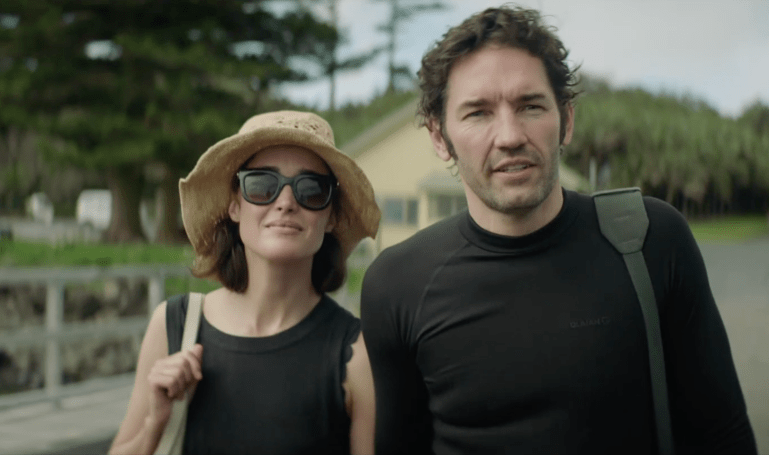Sydney Film Festival today announced the 10 shorts to compete in the Dendy Awards for Australian Short Films, including Jon Bell’s SXSW-winner The Moogai and Nash Edgerton’s follow-up to Bear and Spider – Shark, starring himself and Rose Byrne.
Also unveiled today are the films selected for the festival’s sixth annual Europe! Voices of Women strand, in partnership with European Film Promotion.
These are the first projects to be announced for SFF since it postponed its dates from August to November due to the COVID outbreak in NSW, with 22 titles also publicised earlier this year.
The Dendy Awards are Australia’s longest running short film competition, now in its 52nd year.
Finalists compete for three prizes: The Dendy Live Action Short Award, The Rouben Mamoulian Award for Best Director and the Yoram Gross Animation Award, announced at the festival’s closing night. The jury will be announced closer to the festival.
Other films in the line-up include The Stranger, written and directed by Jenny Hicks, who is a prolific editor, and Dwarf Planet from writer/director/editor Adrian Chiarella. Animations include Freedom Swimmer, from China Love director Olivia Martin-McGuire, and the Australian Production Design Guild-nominated Lifeblood, from Nicholas Tory.
Festival director Nashen Moodley tells IF 2021 saw more submissions to the shorts program than ever before. The projects were selected by programmer Paul Matereke and cover a diverse range of films and filmmakers.
“The range is quite tremendous,” he says.
“Each year we know that prominent producers and very experienced filmmakers look at the selection and these films to search for new talent, and I think there’s plenty on display this year.”
The films are:
- Dwarf Planet | 2020 | Director, screenwriter: Adrian Chiarella
- Freedom Swimmer| 2021 | Director, screenwriter: Olivia Martin-McGuire
- Lifeblood | 2021 | Director, producer: Nicholas Tory
- The Moogai| 2020 | Director, screenwriter: Jon Bell
- Off the Rails | 2021 | Directors, screenwriters, producers: Bel Holborow, Isabelle Coury
- Peeps| 2020| Director, screenwriter: Sophie Somerville
- Shark | 2021 | Director, screenwriter: Nash Edgerton
- The Stranger | 2020| Director, screenwriter: Jenny Hicks
- Tinashé| 2021 | Director, screenwriter: Tig Terera
- tough| 2021 | Director, screenwriter: Taylor Ferguson
For Moodley, the Europe! Voices of Women in Film strand, which was also included in last year’s virtual line-up, is trying to address the gender imbalance in the making of cinema. He describes this year’s line-up as powerful.
A highlight is Blerta Basholli’s Hive from Kosovo, the first film in Sundance Film Festival’s history to win all three main awards – the Grand Jury Prize, the
Audience Award, and the Directing Award.
There are also number of films that were selected for the cancelled Cannes 2020, such as Pleasure from Ninja Thyberg; Charlène Favier’s Slalom, and Isabel Lamberti’s Last Days of Spring,.
“Each year for the last several years, we’ve presented quite a fascinating range of films, from really big award winners and established filmmakers, but mostly emerging filmmakers – both features and documentaries,” Moodley says.
“It’s going to be quite an exciting line-up once again.”
The films are:
- From the Wild Sea | 2021 | Denmark | Director: Robin Petré
- Green Sea| 2020 | Greece | Director, screenwriter: Angeliki Antoniou
- Hive| 2021 | Kosovo, Switzerland, Macedonia, Albania | Director, screenwriter: Blerta Basholli
- How to Kill a Cloud| 2021| Finland, Denmark | Director, screenwriter: Tuija Halttunen
- Last Days of Spring| 2020 | Netherlands, Spain | Director, screenwriter: Isabel Lamberti
- Nico | 2021| Germany | Director: Eline Gehring
- Pleasure| 2021 | Sweden, Netherlands, France | Director, screenwriter: Ninja Thyberg
- Reconciliation |2021| Slovenia, Serbia, Montenegro, Kosovo | Director: Marija Zidar
- Slalom| 2020 | France | Director, screenwriter: Charlène Favier
- Why Not You | 2020 | Austria, Belgium | Director, screenwriter: Evi Romen
As for the decision to postpone, Moodley says the response so far has been extremly positive.
“I think people understand that it’s exceedingly difficult to plan a film festival, or indeed any event that is dependent on the gathering of people, in this time. So there’s been a really positive response from filmmakers, the industry, the audience, and all stakeholders. People would love for the festival to happen in cinemas, if it can happen safely. That’s what we aim for.
“We’re really determined that the in-cinema festival is what we do best; what we love and what the audience loves. We want to return to that as soon as possible and as soon as it’s safe to do so.”


